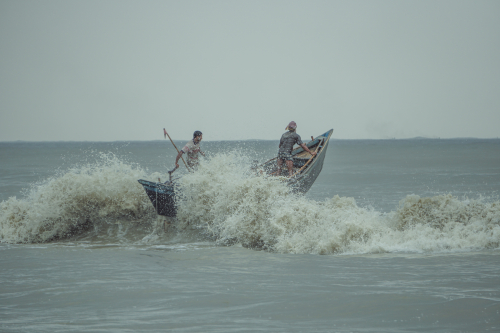
Guy Courtecuisse/The BFI London Film Festival
MOVIE REVIEW
The Salt in Our Waters (2020)
Rudro (Titas Zia) is perhaps a little slow on the uptake. He is an artist, with his entire life and work in a wooden shipping crate, installing himself in a remote village at the invitation of his friend Bashar (Ashok Bepari). There he plans to work on his sculptures in an inspirational, generally unmolested and very cheap setting. But things don’t run smoothly. His crate is not released from the port in Chittagong without a bribe being paid. The villagers, primarily fishermen who spend long days at sea, are not delighted by having a city mouse in their midst. The village is controlled by The Chairman (Fazlur Rahman Babu), who’s generally a reasonable mayor only everyone knows he plays favorites in disputes. Rudro is a cheerful guy who expects everyone will see things his way. Life in the village is about to teach him a new lesson.
Writer-director Rezwan Shahriar Sumit has made a culture-clash movie that doesn’t spin on the stereotypes people in the West have about either Islam or Bangladesh, and the film is a thousand times more interesting for going its own way. Instead we have Rudro accidentally stepping on the fault lines of power within the little village – between people who are glad to have The Chairman making most of their decisions, and those who bridle at his leadership but who still don’t want to leave. Refreshingly, even though the village is tiny and its treatment of women leaves something to be desired, the villagers are all shown as smart people aware of the wider world. They just don’t choose to live in it. They like their home as it is and don’t much care to have a fancy artist prancing around, even if he is paying Bashar a lot of money. It skips no one’s notice that the ilish fish on which villagers rely stop coming to their normal grounds as soon as Rudro moves in. When Rudro makes the boys of the village toy fish out of old plastic buoys, the villagers are upset enough to confiscate and burn them all. Art should not create idols, Rudro is repeatedly told. When Rudro makes the case for what he is working on, about half the village decides blaming his work for the absence of the ilish fish is silly and grudgingly lets it go. The other half notices how Bashar’s daughter Tuni (Tasnova Tamanna) is always around Rudro’s cottage.
Ms. Tamanna is very good indeed as a young woman who likes her home and family but is drawn to the life Rudro enjoys in spite of herself. Her questions and encouragement are salve to Rudro’s dignity; he never treats her like a backwards village girl while also never doing anything that might compromise her. Mr. Zia does great work of being a decent man whose preoccupation with his own work and feelings is getting knocked out of him. After the incident with the toy fish, Rudro attends the village mosque to try to make nice, only his head is uncovered, a mistake he does not make again. The Chairman does not like his power being threatened, even indirectly, but is canny enough to understand that over-reacting to Rudro’s presence will turn the village against him. But even if Rudro leaves, the question of Tuni will stay behind.
There is plenty of menace in this pretty place, and as the movie progresses the problems of the people and of the weather come together. The rising wind of the coming storm leads to several beautiful shots by Chananun Chotrungroj of villagers in wind-whipped clothes, attempting to hammer nets in place on the sea floor or simply watching anxiously for the boats to come home. It’s a gorgeous reminder to the importance of place in cinema and that real feeling can only be faked with special effects.
All Tuni and Rudro’s interactions take place with Tuni’s little brother Taher (Naimul Rahman Apon) present, but while Tuni allows Taher’s curiosity to take the lead she does plenty of thinking for herself. It’s her idea to show Rudro the Crystal Gold, a cargo ship wrecked since 2017, and the scenes of them exploring the massive abandoned vessel are nerve-wracking; but Mr. Sumit is smart enough to ensure we’re not worrying for the right reasons. This is a beautiful and unusual film in which human nature and uncooperative weather are the only real villains, but “The Salt in Our Waters” is a smart reminder that both of those issues are more than enough.
Comments